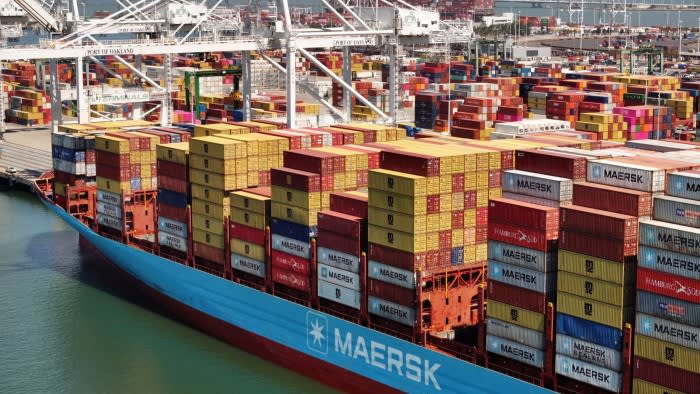Unlock the Editor’s Digest for free
Roula Khalaf, Editor of the FT, selects her favourite stories in this weekly newsletter.
Retailers and manufacturers are bringing orders forward amid fears of an intensifying trade war between China and the US under a Trump presidency in a move that could further worsen supply chain problems, according to the boss of AP Møller-Maersk.
Vincent Clerc, chief executive of the world’s second-largest container shipping company, told the Financial Times that some customers were placing their orders for Christmas earlier than normal.
“There’s clearly, not only for the US but in general, customers bringing orders forward — because of disruption, because of the potential for a trade war, people would rather have Christmas goods already in the warehouse. It’s hard to say how much is going on though,” he said.
Global supply chains had only just recovered from the intense disruption following the Covid-19 pandemic when Houthi attacks at the end of last year caused most vessels to avoid the Red Sea and instead sail around the Horn of Africa.
Maersk last week raised its financial guidance for 2024 for the third time since May as it benefits from that disruption now lasting throughout this year, as well as higher-than-expected global trade growth. “Each month, it looks like it is getting more and more entrenched,” Clerc said of the Red Sea disruption, although he declined to comment on whether he thought it could carry on into 2025.
The Maersk chief had in June already warned customers not to bring forward their Christmas orders due to the disruption. But shipping experts have said in recent weeks that Trump’s warnings of high tariffs on Chinese goods could cause importers in the US and elsewhere to make orders earlier than planned, something Clerc confirmed.
Maersk said on Wednesday that “Chinese exports stood out once more with year-on-year growth close to 10 per cent in Q2.”
The views of the Danish group, which transports about a fifth of all seaborne freight, are significant as it is a bellwether of global trade.
Although stock markets have in recent days worried intensely about the potential for the US economy to move into recession, Clerc said Maersk did not “see any sign that the US is moving into recessionary territory”. He added that inventories were higher than at the start of the year but that they had been “very low” then, while “demand is OK”.
Clerc said that “one of the big uncertainties is how long demand is going to be as resilient as it is today”.
The Danish group now expects underlying operating profit for the full year to be $3bn-$5bn after it started the year forecasting a loss of up to $5bn. It made an operating profit of $1.1bn in the first six months of this year, down from $3.9bn in the same period of 2023.
Maersk said on Wednesday it was still looking for acquisitions in its land-based logistics business, which it is building up to offer a counterweight to container shipping. “We stay open for the right match,” said Clerc.


